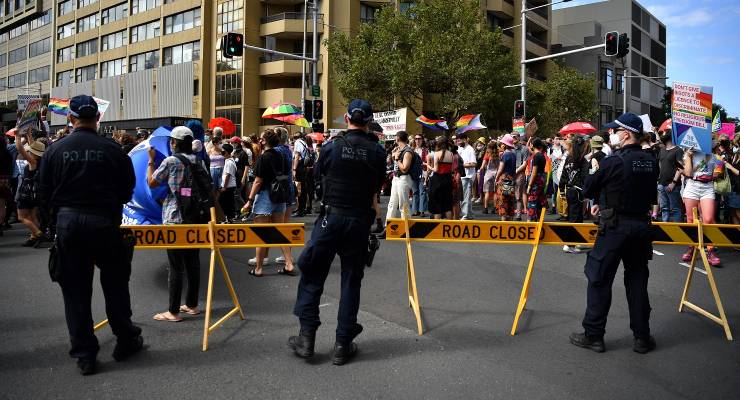
At the recent Sydney Mardi Gras Festival 2023 AGM, members overwhelmingly voted to abandon an agreement with NSW Police regarding police presence at future parades.
The Police Accord, established in 2014, is a memorandum of understanding with NSW Police that allows Mardi Gras to have input into the planning for a legally required police presence at each festival event.
The accord was established after an investigation into the “brutal” arrest of 18-year-old partygoer Jamie Jackson Reed in 2013, who was handcuffed and slammed to the ground by former constable Leon Mixios. The officer was later found by an investigation to have used “unreasonable force” under Section 181D of the Police Act. Mixios appealed the finding but resigned during the appeal process, with the NSW police commissioner withdrawing the Section 181D order in the process.
The recent Mardi Gras motion moved that the accord be “torn up and cancelled”. This includes “the removal of drug dogs, the condemnation of so-called ‘decency checks’, and a stance towards police abolition in solidarity with worldwide justice movements”.
However, a spokesperson for the festival claimed media outlets including the ABC and LGBTQIA+ community news outlet Star Observer have wrongly reported that the accord gave police powers to conduct “decency checks” of parade participants.
“This is not the case,” the spokesperson told Crikey.
By law, “lower frontal genitalia” must not be visible when in public, meaning these checks can lawfully be executed regardless of the accord. What the accord does outline is when and how these checks take place.
“It’s not in [Mardi Gras’] power to stop it, only to help facilitate so the community feels protected,” the spokesperson said.
The festival says that involvement in the accord “has been to advocate for the LGBTQIA+ community and assist in ensuring that the laws all people must adhere to are enacted in ways that are appropriate to our communities”.
The festival added that “every large-scale event in NSW is required by law to have a police presence. As one of the largest gatherings in NSW, Sydney Mardi Gras nor the parade is exempt from this.”
Police presence at the festival has long been a contentious topic, as community activist and Pride in Protest member Luc Velez explains: “The original march was a violent and oppressive day.”
Founded in 2018, 40 years after the first Sydney Mardi Gras, Pride in Protest has continued to be vocal in its opposition to NSW Police’s presence at the event.
“We are not honouring our communities’ histories if we are giving organisations like NSW Police a platform to present themselves as queer friendly and progressive,” Velez told Crikey.
Velez was also one of four individuals recently elected to the board of the festival and says that increasing Pride in Protest representation on the festival’s board is important “to steer the festival back in the direction of its protest roots”.
In his opinion, the question being asked by rainbow communities is not about what powers the accord may or may not grant, but whether in the context of the festival “decency checks” — or a police presence — should exist at all.
“Using terms like ‘decency checks’ to talk about how someone is dressed, even in its most simple form, proves a huge problem for queer people,” Velez said.
“Even outside of the pride context there’s a long history where queer bodies and aesthetics have been told they are not appropriate. It’s not even about nudity, particularly so for our trans and non-binary comrades.”
Many are also concerned about other extraordinary powers held by NSW Police.
Most concerning are those granted along with the introduction of the Law Enforcement (Powers and Responsibilities) Act by former NSW attorney-general Bob Debus in 2002.
Aimed to curb illicit drug use across the state, Section 33 of the act permits officers to perform strip searches of an individual if suspected of carrying or being under the influence of illicit substances.
Research shows there was a 20-fold increase in strip searches being conducted by NSW Police between 2005, when the law came into effect, and 2018. A 2018 government inquiry handed down some 25 recommendations aimed at improving the protocols around the use of strip searches.
While attending the Mardi Gras Parade in February of this year, NSW Greens MP Cate Faehrmann said she witnessed event participants being detained and strip-searched by NSW Police. Soon after she went public with her concerns around the use of these search methods.
Fellow party member, NSW Greens LGBTQIA+ spokesperson and GP Dr Amanda Cohn echoes these concerns.
“The presence of police sniffer dogs and strip searches at Mardi Gras doesn’t just feel violating — they make us less safe, for example, by causing people to take a large quantity of drugs at once,” Cohn told Crikey.
NSW Police would not be drawn to comment on the unfolding situation, instead issuing a brief statement telling Crikey: “The NSW Police Force works closely with Mardi Gras organisers to ensure the safety and success of its events.”








NSW Police, still….. upholding their historical reputation as Sydney holds the mantle of competing with QLD on Christian nationalist and conservative values.
Generations ago in the ’70s with Rupert ‘Dick’ Hamer’s government, the Victorian Libs were viewed as more socially ‘liberal’ than the NSW ALP right….now aghast at Dutton’s QLD LNP now running the show…..
Religious Parades, A Rally for Peace, Union Parades, Christmas Festival Parades, Climate Change Action Groups, Shire Harvest Festival. Iron Ore festivals in Mining communities, Farmer’s Action Groups, Truckers Lobby Groups, and so on.
In my humble opinion, The LGBTQIA+ community is, like me, not above the law. The same rule for me, the same rule for you, you are no more unique than anyone passionate about their cause. In my experience, bullying to get your outcome will not end well. You are a part of the Australian community’s lifestyle and beliefs. Stay within community standards at public parades, and you will continue to be a great and successful event.
Without a fringe pushing the boundaries we all confirm and die a hundred deaths. What they are asking for is perfectly reasonable. It’s the increasing authoritarianism and the acquiescence of people such as yourself to this threat that is the real worry.
Hi Billy Not sure that I agree with you,however, you are entitled to your opinion, as am I.
“lower frontal genitalia” must not be visible when in public, to me is not a bad thing as many family groups line the streets enjoy the spectacle and the music.
“The presence of police sniffer dogs” ( incidently I am not opposed to breath tests either) I have a daughter, who is a paramedic, and she has attended many overdose drug and alcohol induced situations, where an overdosed/drunk person, has harmed themselves or some one else. Do we need this to happen in a festival parade?
Enjoy your parade may it long remain a favorite of many in the community,
How would this work out for the current environmental protests? Pushing the boundaries is a part of protest, staying within the law, or even within community standards has never been effective. The Mardi Gras is a parade, but one that is based on protesting against very unfair and even brutal laws, and no one in the parade has forgotten that.
Hi Frank, I share your concerns about the complexity of how to stage environmental protests given the cosy relationship between fossil fuel and government and MSM media.
However back in 2017, Australia passed laws for same-sex marriage and the LGBTQIA+ cause has continued to flourish since then I hope that Parade ideals have also moved on.
Judging by the popularity of the event, most of the Australian community has.
Your argument seems to deny that law enforcement is equal for all in the community. Facts including the recent enquiry into police treatment of homosexual members of my community show this is not the case. Police have a sorid and shameful record of racists and homophobic enforcement that they are no desire to change. By their own actions, the police do not treat everyone with equality.
In Toronto, Canada the police have been banned from marching in parades because of past brutality no different from the enthusiasm of NSW police to interpret laws that targeted gay men and women particularly during the AIDS epidemic. There are now almost NINETY gay hate crime deaths that are unsolved by NSW police from the 80’sand 90’s and the recent NSW govt inquiry held into these deaths remarked on the sloppy, could care less, cavalier attitude of NSW police to law abiding tax paying gay citizens is still wanting and certainly a huge question mark for many gay ppl. There has never been an apology for past violence or complete ineptitude for unsolved murders. Again in 2024, I could care less what ppl are wearing but more concerned with the police doing their job and protecting gay citizens than the heavy handed tactics of a past oppressor dressed up as a cuddly morphed prison guard with random strip searches and sniffer dogs and censoring their version of dress code when their own behavior both past and present is a huge question mark and a fail in terms of impartial interpretation of the law for ALL NSW citizens